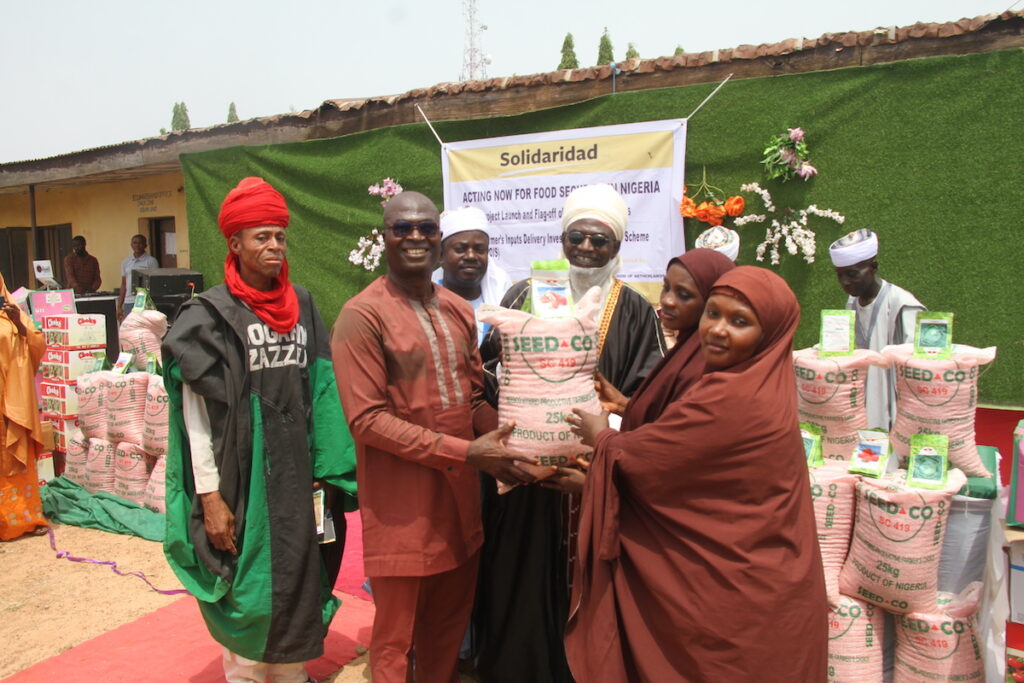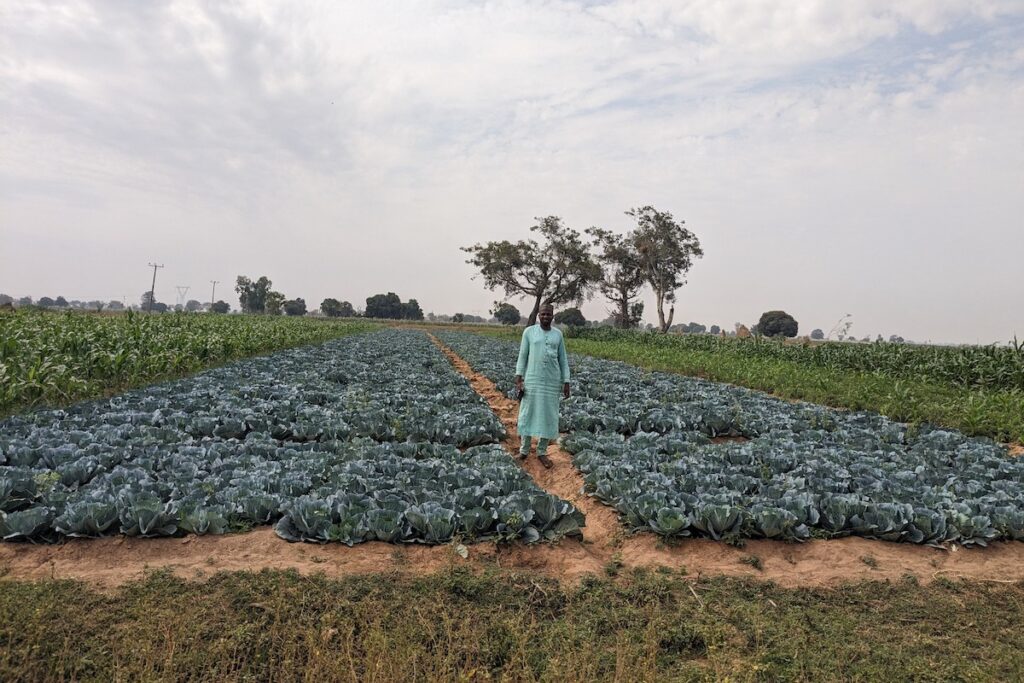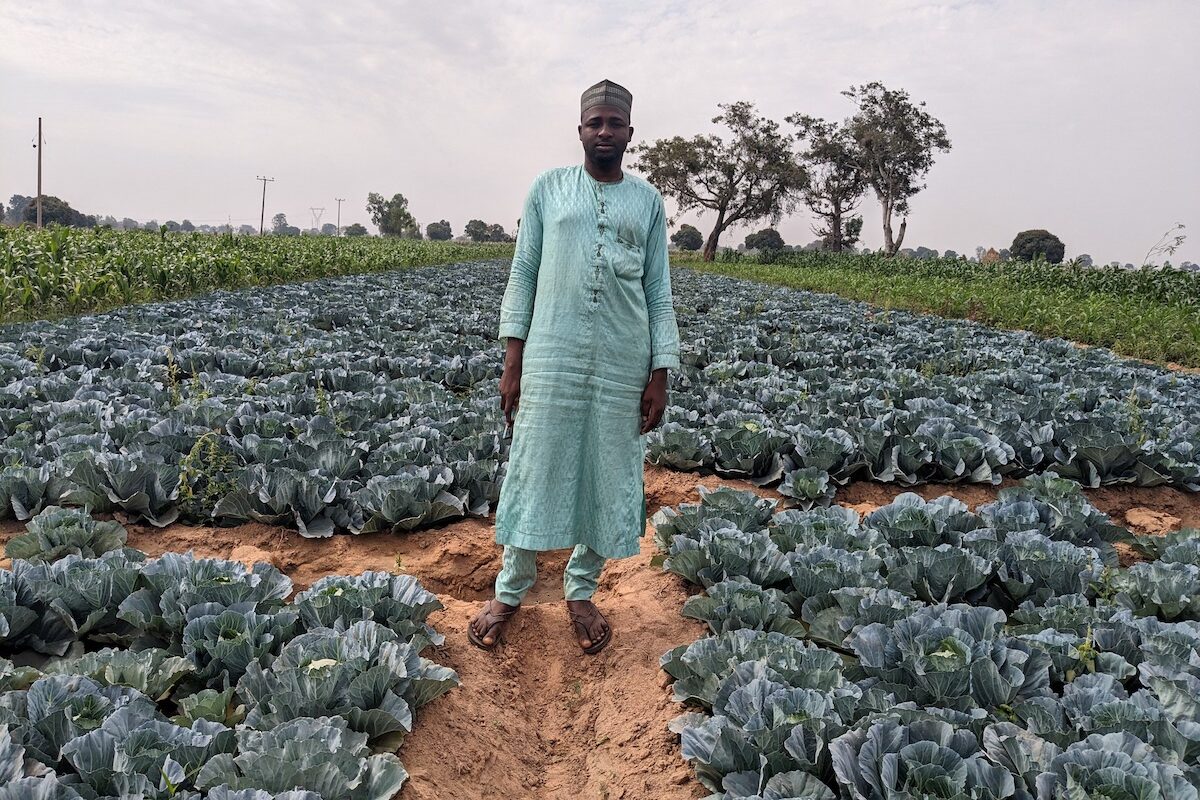Aliyu stands amidst maize and cabbages on his farm that have been planted with support from the Farmers’ Inputs and Delivery and Investment Scheme in Nigeria.
What if your dream of improving your family’s future hinged on overcoming a single obstacle – the ability to invest in quality seeds to improve your farm? This barrier seemed insurmountable to Aliyu Sani, a 28-year-old farmer from the Kano state of Nigeria.
While Aliyu owned four hectares of land, the high cost of seeds and other farm inputs prevented him from developing his farm to its fullest potential. This left him cultivating only a fraction of his farmland, and year after year, his dreams for the future seemed further out of reach.
“I have four hectares of land from which I could make a good harvest, but that has not been possible because I cannot afford inputs to cover such an area of land. Most years, I cultivate less than a hectare of the land,” says Aliyu.
Everything changed with the introduction of the Farmers’ Inputs and Delivery and Investment Scheme (FIDIS) in his community.
Launched in September 2023 as part of the Acting Now project, the scheme offered Aliyu and 2,600 other smallholder fruits and vegetable farmers in the states of Kaduna and Kano the opportunity to procure quality seeds upfront, with repayment delayed until after harvest helping them surmount the biggest barrier to improving production.

This support was made possible through the organization of farmer groups and Village Savings and Loans Associations (VSLAs), which were established by Solidaridad West Africa in the project’s implementing communities. Once farmers repay the funds, they are channeled back into the community farmer groups and VSLAs to ensure future procurement and distribution of inputs during subsequent planting seasons.
With the scheme’s assistance, Aliyu was able to make optimal use of his land for the first time. In 2023, he accessed the credit offered by his farmer group to procure cabbage and maize seeds worth 120,000 Nigerian naira (65.7 euros). With these seeds, he increased the area under cultivation on his land to 2 hectares.
By the time Aliyu repaid the seed-purchase loan to his farmer group, he had significantly increased his yield and made an income of 750,000 Nigerian naira (410 euros). The increased income served as motivation for Aliyu to procure even more seeds for the next farming season.
“I procured seeds worth 200,000 Nigerian naira (109.5 euros), which I cultivated on three hectares of my land. My average income from the sale of cabbage during a farming season used to be 450,000 Nigerian naira (246.3 euros), but I made an income of 1.3 million Nigerian naira (711 euros) this season and an additional 800,000 Nigerian naira (438 euros) from maize,” Aliyu explains with pride.

The increased income allowed Aliyu to fulfill a long-held personal dream to enroll his five children in elementary school. For Aliyu, what once had seemed like an unattainable goal has now become a reality, thanks to the support from the Farmers’ Inputs and Delivery and Investment Scheme.
Aliyu Sani’s story illustrates how strategic support can help farmers fully realize their land’s potential to transform their agricultural practices and livelihoods.
Kenechukwu Onukwube, Solidaridad Programme Manager in Nigeria
Through the FIDIS project, Solidaridad is taking steps to address the difficulties farmers face to access quality inputs. As an added benefit, the scheme provides farmers with the resources and knowledge to drive sustainable production and enhance local food systems.
About Acting Now
The Acting Now programme targets 12,000 farmers in Nigeria and supports the sustainable production of fish, potatoes, maize, fruits and vegetables in the Kaduna, Kano, Plateau and Ogun states. The initiative is designed to provide farmers with knowledge and skills for sustainable production and addresses vulnerable food production systems within the country. Additionally, it supports entrepreneurship, promotes technology integration, enhances financial literacy, and facilitates market access.
The programme is funded by the Dutch Ministry of Foreign Affairs as part of a comprehensive effort to transform the agricultural landscapes within implementing countries. In Nigeria, Acting Now seeks to boost food security by increasing smallholder farmers’ resilience and establishing robust food systems that can mitigate the effects of climate change, while increasing food security for those in need.

